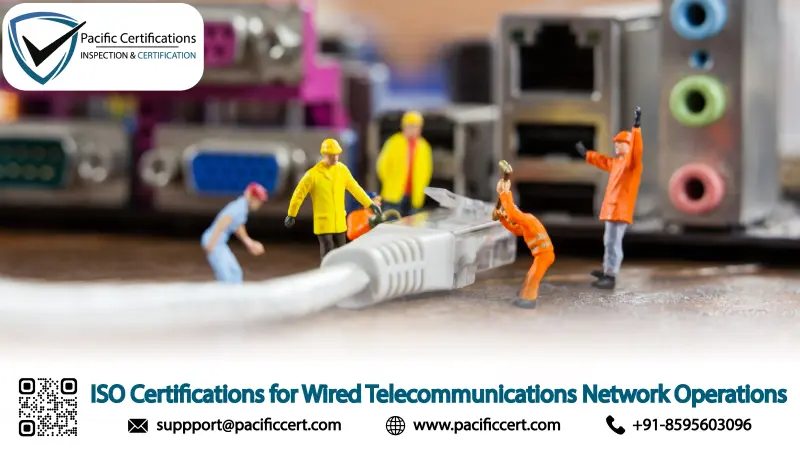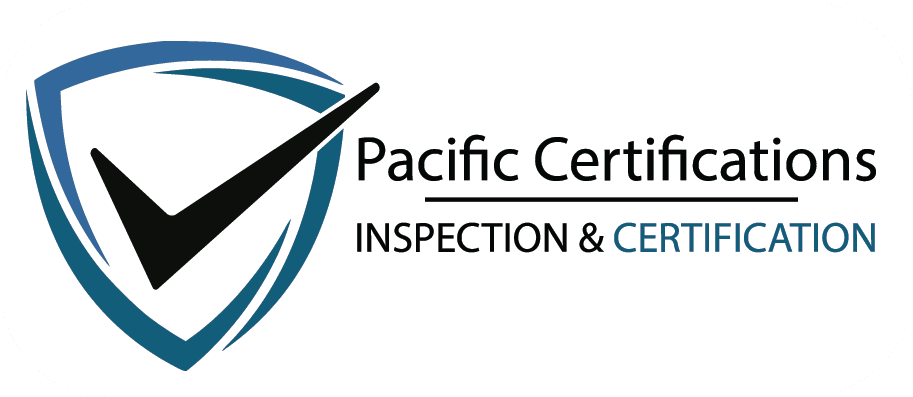ISO Certifications for Wired Telecommunications Network Operations, Requirements and Benefits

Introduction
Wired telecommunications operators are essential to global connectivity, from supplying broadband, internet to fixed-line communication services for businesses, governments, and homes. As data usage rises and cybersecurity risks become more complex, these companies face growing pressure to keep their networks reliable and secure. Keeping customers happy is especially important in an industry that’s changing so quickly.
Telecommunications providers can better meet these challenges by adopting internationally recognized ISO standards. Implementing ISO helps guarantee reliable service, safeguards networks from cyber threats, supports environmental responsibilities, and earns customer confidence, all while making daily operations smoother.
With global fixed broadband subscriptions projected to exceed 1.6 billion by 2030, wired telecommunications operators must rely on structured management systems rather than fragmented operational controls. ISO certifications provide internationally recognized frameworks to standardize network operations, manage risks, and demonstrate reliability and compliance in a highly regulated and competitive environment.
A resilient telecom network isn’t built overnight; it’s achieved through disciplined quality, safety, and security management. — Pacific Certifications
Quick Summary
ISO certifications help wired telecommunications network operators improve service quality, protect network and customer data, reduce operational and safety risks, ensure business continuity, and manage environmental impact. The most relevant standards include ISO 9001, ISO 14001, ISO 45001, ISO/IEC 27001, ISO 22301, ISO 50001, and ISO 55001. Certification reassures regulators, enterprise customers, and end users that network operations are stable, secure, and future-ready.
For more information on how we can assist your wired telecommunications operations with ISO certifications, please contact us at [email protected].
Applicable ISO Standards for Wired Telecommunications Network Operations
Wired telecom operations span network quality, infrastructure safety, energy consumption, cybersecurity, and service continuity. Multiple ISO standards apply because telecom networks involve critical infrastructure, sensitive data, and uninterrupted service obligations. Below are the key applicable ISO standards for wired telecommunications network operations:
ISO 9001: Quality Management System (QMS)
ISO 9001 helps wired telecom operators standardize processes such as network provisioning, fault management, maintenance, service activation, and customer support. It ensures that service quality is consistent across regions and access technologies, reducing recurring faults, delays, and customer complaints.
ISO/IEC 27001: Information Security Management System (ISMS)
Wired telecom networks handle vast amounts of sensitive data, including customer information, network configurations, and traffic records. ISO/IEC 27001 provides a structured, risk-based approach to securing this information against cyber threats, unauthorized access, and system compromise.
ISO 22301: Business Continuity Management System (BCMS)
Network outages caused by cable cuts, power failures, natural disasters, or cyber incidents can disrupt services at scale. ISO 22301 ensures that telecom operators identify critical network functions and maintain continuity or rapid recovery of services during disruptions.
ISO/IEC 20000-1: Service Management System (SMS)
This standard is designed for service management and ensures that services meet customer and business needs. It can be applied to enhance service delivery, response times, and customer support in telecommunications.
ISO 45001: Occupational Health and Safety Management Systems
Wired telecom operations involve field work such as cable installation, trenching, working at heights, confined spaces, and electrical environments. ISO 45001 helps operators manage occupational risks, protect technicians, and reduce workplace incidents.
ISO 14001: Environmental Management System (EMS)
Telecom infrastructure affects land use, energy consumption, electronic waste, and emissions from network facilities. ISO 14001 helps operators manage environmental aspects responsibly and comply with environmental regulations and community expectations.
ISO 50001: Energy Management Systems
Energy costs are significant in wired telecom operations due to exchanges, data centers, and cooling systems. ISO 50001 provides a framework to monitor energy use, improve efficiency, and reduce operational costs and carbon footprint.
Click here to find out more applicable standards to your industry
What are the generic requirements of ISO certifications for Network Operations?
The certification process involves meeting specific requirements and yields several benefits. Below are the key requirements:
Generic Requirements (Applicable across all standards):
Establish information security, quality, and safety policies aligned with business goals.
Identify and mitigate risks related to service disruption, data breaches, and infrastructure failure.
Define and document key operational processes — network maintenance, incident response, fault repair, and change control.
Ensure personnel are trained in safety protocols, data handling, and emergency procedures.
Conduct periodic internal audits to evaluate compliance and effectiveness.
Leadership must review performance, risks, and opportunities regularly.
Address nonconformities and continually improve processes.
Align with telecom regulations, data protection laws, and environmental norms.
Maintain accurate logs of incidents, downtime, training, and maintenance activities.
What are the specific requirements of ISO certifications for Network Operations?
ISO 9001: Quality Management System (QMS) Requirements
Leadership Commitment: Top management must demonstrate commitment to the QMS, ensuring quality objectives align with the business strategy.
Customer Focus: Processes must be designed to meet customer requirements and enhance customer satisfaction.
Process Approach: The organization should manage activities as processes and systems.
Performance Evaluation: Regular monitoring and measuring of processes against quality objectives.
Continual Improvement: The organization must continually improve its processes and QMS.
ISO/IEC 27001: Information Security Management System (ISMS) Requirements
Risk Management: Identify, assess, and treat information security risks.
Security Policy: Develop and implement an information security policy.
Asset Management: Identify information assets and define appropriate protection responsibilities.
Employee Training: Train staff in their security roles and responsibilities.
Incident Management: Establish a process to manage information security incidents.
ISO 22301: Business Continuity Management System (BCMS) Requirements
Business Continuity Policy: Develop a policy that reflects organizational context and scope.
Business Impact Analysis (BIA): Identify critical business processes and the impact of a disruption.
Continuity Strategies: Develop strategies to mitigate the impact of disruptions.
Training and Awareness: Ensure staff are trained and aware of their role in business continuity.
Testing and Reviewing: Regularly test and review the BCMS to ensure its effectiveness.
ISO/IEC 20000-1: Service Management System (SMS) Requirements
Service Management System: Establish, implement, maintain, and continually improve an SMS.
Service Design and Transition: Design and transition new or changed services.
Service Delivery Processes: Ensure consistent and reliable service delivery.
Relationship Management: Manage relationships with involved parties and customers.
Continuous Improvement: Continual improvement of services and service management processes.
Tip: Integrate network monitoring, incident management, and data protection within a unified management system — it reduces downtime and boosts trust.
Looking for ISO certification for your wired telecommunications operations? Email us at [email protected].
What are the benefits of ISO Certifications for Wired Telecommunications?
Below are the key benefits of implementing ISO standards into wired telecommunications operations:
Minimizes outages, downtime, and performance degradation through systematic risk management.
Protects subscriber data, transmission integrity, and system availability.
Ensures compliance with telecom authorities, data protection acts, and safety legislation.
ISO-certified operators gain trust among enterprise clients and regulators.
Streamlined workflows reduce rework, resource wastage, and operational overhead.
ISO 45001 fosters a safer work environment for field technicians and engineers.
ISO 14001 reduces carbon footprint through energy-efficient operations and responsible waste disposal.
ISO 22301 ensures rapid recovery and minimal service interruption during natural or technical disasters.
Wired telecommunications networks remain critical despite the growth of wireless technologies. According to industry data, global fixed broadband subscriptions exceeded 1.4 billion in 2024 and are expected to reach 1.6–1.7 billion by 2030, driven by fiber-to-the-home (FTTH) expansion, enterprise connectivity, and data-intensive applications.
Fiber deployment continues at scale. Industry reports indicate that global fiber-optic cable installations are growing at 8–10% annually, with governments investing heavily in national broadband infrastructure. At the same time, network reliability expectations are rising, with regulators imposing stricter service-level and outage reporting requirements.
Cybersecurity has become a major concern. Telecommunications networks are classified as critical infrastructure, and sector-specific studies show a 30–40% increase in attempted cyber intrusions targeting telecom systems between 2022 and 2025. This trend is driving increased adoption of information security management systems.
Energy efficiency is also under scrutiny. Telecom networks account for a growing share of global electricity consumption, and operators are under pressure to reduce emissions. Structured energy management programs have been shown to deliver 10–15% reductions in energy consumption within three years of implementation.
In coming years, ISO-aligned governance—particularly ISO 9001, ISO/IEC 27001, ISO 22301, ISO 50001, and ISO 55001, is expected to be a baseline requirement for wired telecom operators managing national and enterprise networks.
How Pacific Certifications Can Help?
Pacific Certifications, accredited by ABIS, provides independent audit and certification services for ISO standards applicable to the telecommunications industry. We do not offer consultancy or training, but we ensure impartial and globally recognized certifications that demonstrate your organization’s commitment to compliance and excellence.
Pacific Certifications can help by:
Conducting third-party audits as per ISO standards.
Issuing accredited certificates accepted worldwide.
Supporting multi-site and integrated management system audits.
Contact Us
If you need support with ISO certification for your for Wired Telecommunications Network Operations business, contact us at [email protected] or +91-8595603096.
Author: Poonam
Read More at: Blogs by Pacific Certifications

